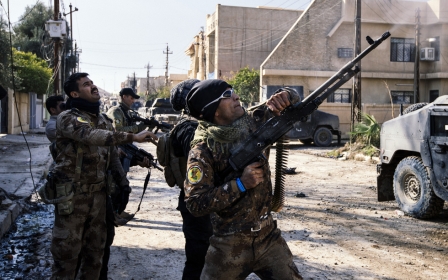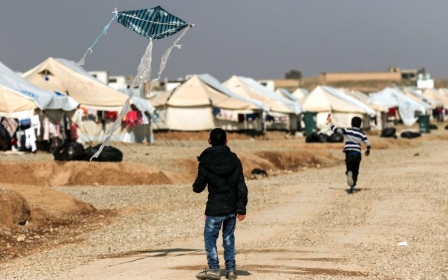Iraqi forces press advance into western districts of Mosul
Iraqi forces on Friday entered a west Mosul district for the first time since the October launch of their offensive to retake the city from the Islamic State group.
The push on al-Maamun, a small area on the southwestern edge of Mosul, came after government troops retook the airport, which commands access to the city from the south, and a nearby military base.
"We have attacked and fully control Ghazlani base, we have also taken Tal al-Rayyan... and we're attacking al-Maamun area," said Sami al-Aridhi, a lieutenant general in Iraq's elite Counter-Terrorism Service.
He told AFP near the front line that IS militants attacked his forces with a suicide car bomb in Tal al-Rayyan, a village just outside Mosul, and that three other car bombs were found there.
Aridhi said the CTS, an elite force, had suffered no losses since the renewed push on west Mosul was launched on Sunday.
He said some fighters had been wounded, however, including by the weaponised drones IS has increasingly resorted to in recent weeks.
AFP reporters south of Mosul said heavy artillery and mortar fire could be heard coming from the southern edge of the city while jets also conducted strikes.
While it was not immediately clear whether CTS forces would seek to push deep into the city or simply set up positions on the edge, the move marks another landmark in the protracted Mosul operation.
CTS has led the weeks-long effort to retake areas of the city on the east bank of the Tigris river, only fully liberating it last month.
Airport secured
They met fierce resistance from IS militants defending their last major stronghold in Iraq and commanders have warned that the west bank, where IS leader Abu Bakr al-Baghdadi proclaimed his caliphate, would be even tougher.
After weeks spent redeploying across the vast theatre of operations, Iraqi forces rekindled the offensive on Sunday, with the airport the initial target.
"I can confirm that the airport is fully liberated," said Brigadier General Abbas al-Juburi, of the interior ministry's elite Rapid Response units that led the assault.
IS militants offered limited resistance at the airport and the nearby Ghazlani base, open and uninhabited areas that are difficult for them to defend in the face of the huge firepower deployed by Baghdad and its allies.
The hardest phase of the offensive on west Mosul still lies ahead.
The west bank of Mosul includes the Old City, whose narrow streets will be impassable for some military vehicles and oblige Iraqi forces to stage perilous dismounted raids.
The militants are completely surrounded in west Mosul and have little choice but to fight to the death.
The Popular Mobilisation Units that have been in charge of a front in desert areas west of Mosul said Friday they were attacked by IS fighters coming from Syria.
Border attacks
PMU forces have moved to within striking distance of the IS-held town of Tal Afar, west of Mosul, and the jihadists are likely to be keen to keep some supply lines to Syria open as they weather the siege on Mosul.
IS militants have continued to harass Iraqi forces in areas that were retaken from them over the past two years.
On Friday, they attacked a border guard position near the Trebil crossing with Jordan, which lies about 500km west of the capital Baghdad.
"Daesh launched an attack with a suicide car bomb and gunmen on the 2nd border guard regiment near Trebil," an officer in the border guard told AFP, using an Arabic acronym for IS.
"The attack came from several directions and killed 15 border guards, including two officers," he said, speaking on condition of anonymity.
Local officials confirmed the attack and death toll.
Stay informed with MEE's newsletters
Sign up to get the latest alerts, insights and analysis, starting with Turkey Unpacked
Middle East Eye delivers independent and unrivalled coverage and analysis of the Middle East, North Africa and beyond. To learn more about republishing this content and the associated fees, please fill out this form. More about MEE can be found here.




